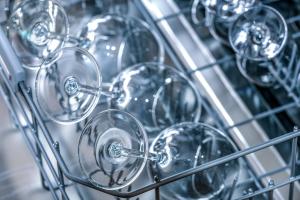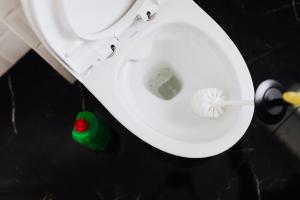
Many people across the UK live with hard water, and unfortunately, hard water can have negative effects on all our appliances. The dishwasher is no different, and with its various moving parts, its impact can be particularly strong here.
Many dishwashers will come with features built-in that attempt to mitigate the impact of hard water. However, no dishwasher is impervious to its effects. If you have a dishwasher in a hard water area, here are some potential issues and ways to keep on top of them, including water softener systems.
Limescale Build-Up
Hard water is caused by increased minerals in the water, particularly magnesium and calcium. Hard water occurs naturally and whether you have hard water or not will primarily depend on your location.
Arguably the biggest impact caused by hard water is limescale, which occurs when said minerals stay behind on surfaces after the water has evaporated. These mineral deposits build over time, creating the white, flaky material associated with limescale and all the issues it can bring.
Clogging & Uneven Cleaning
Dishwashers are complex pieces of kit which rely on water being sprayed onto dishes and glasses at specific times, directions and temperatures. Limescale goes wherever hard water goes, and this means it can build in awkward places in your dishwasher, such as the tiny holes in the spray arms.
Even a small amount of limescale can be enough to start clogging some of these spray holes. Having one blocked might not be a huge issue, but when multiple are blocked, you’ll start to notice uneven cleaning and some areas of your dishwasher not getting the same treatment as others.
Increased Electricity Use
Another area of a dishwasher that limescale can impact is the heating element. Through the element and thermometers, dishwashers make sure your items are being cleaned at a perfect temperature that’s safe for glassware but also gets rid of stubborn stains.
Over time, limescale can form on heating elements and act like an insulator, making it harder to heat the dishwasher. This means your dishwasher will use more power until it heats to the right temperature, not only increasing the amount of electricity used each time but also potentially harming your machine long-term.
Dull Dishes and Glassware
If you find yourself having to re-wash or wipe down your items after every dishwasher run, your hard water could be to blame.
Just as they create limescale, the minerals in hard water love clinging onto surfaces, including your plates. They can also mix with the detergent to create a thin film that clings onto stuff (more on that in the next point).
The result of this is plates and glasses emerging from the dishwasher looking dull, streaky, or just generally unclean.
More Detergent Required
If you’ve ever found yourself questioning the strength of your dishwasher tablets, this could be down to hard water, too.
Hard water loves attaching itself to stuff, and cleaning products are particularly enticing to these pesky minerals. Dishwasher tablets have their cleaning efficacy reduced because the minerals are taking up their attention, reducing their ability to create suds and spread across all the dishes. You’ll notice this with all cleaning, from washing machines to baths and showers.
As a result, you may find yourself needing to add more detergent to your dishwasher than is recommended, which costs more in the long run.
More Salts Needed
Dishwasher salt is recommended to try to combat the effects of hard water (see more information on hard water prevention at the end of this article). However, salt will add to the expenses of running your machine.
Many dishwashers have a compartment where dishwasher salt can be added. This salt is used during the cleaning process in the same way that water softeners use salt.
Dishwasher salt can be useful in softening your water and reducing the potential impact of limescale. However, it’s not a foolproof solution, and it’s an additional expense adding to the costs of running your dishwasher.
Shorter Dishwasher Lifespan
All of the problems above are annoying on their own, but when you add them together, you can see why hard water is bad news for appliances.
Ultimately, with limescale build-up putting increased strain on your dishwasher, you can expect it to need new parts or a complete replacement sooner than if you had soft water in your home. While regular cleaning regimes can help, it’s almost impossible to eradicate all the effects if there’s still a hard water source.
How to Prevent Hard Water Effects on Dishwasher
Thankfully, you don’t need to live with the impact of hard water on your dishwasher. There are a few things you can do to reduce its impact or remove hard water altogether.
Use Rinse Aid
Most dishwashers will recommend using rinse aid alongside your dishwasher tablets and salts. This stuff is a water repellent, making it harder for water to stick to your plates and glasses.
Of course, rinse aid might not be enough on its own to combat all the effects of hard water, but it should help you enjoy cleaner-looking dishes straight out of the wash.
Clean Regularly
There are few substitutes for a good cleaning schedule. Getting into a routine of cleaning your dishwasher’s filter, arms, and interior surfaces of any deposits will help ensure they keep running at their best for longer.
While the thought of having to clean your dishwasher isn’t exactly motivating, it’s what’s required to at least slow down the impact of hard water on your appliance.
Use a Water Softener
If the thought of having to regularly fix or replace your dishwasher isn’t appealing, the best solution is to rid your household of the hard water problem entirely.
Water softeners are a simple and easy way to ensure your home gets a regular supply of soft water. This means you won’t need to worry about limescale in your dishwasher and other appliances, such as washing machines and boilers.
By protecting your appliances and ensuring they perform at their best for longer, water-softening systems can often save households a lot of money long-term.
To discover the many other benefits of soft water or to get a quote for installing a water softener in your home, why not get in touch with our team today?











